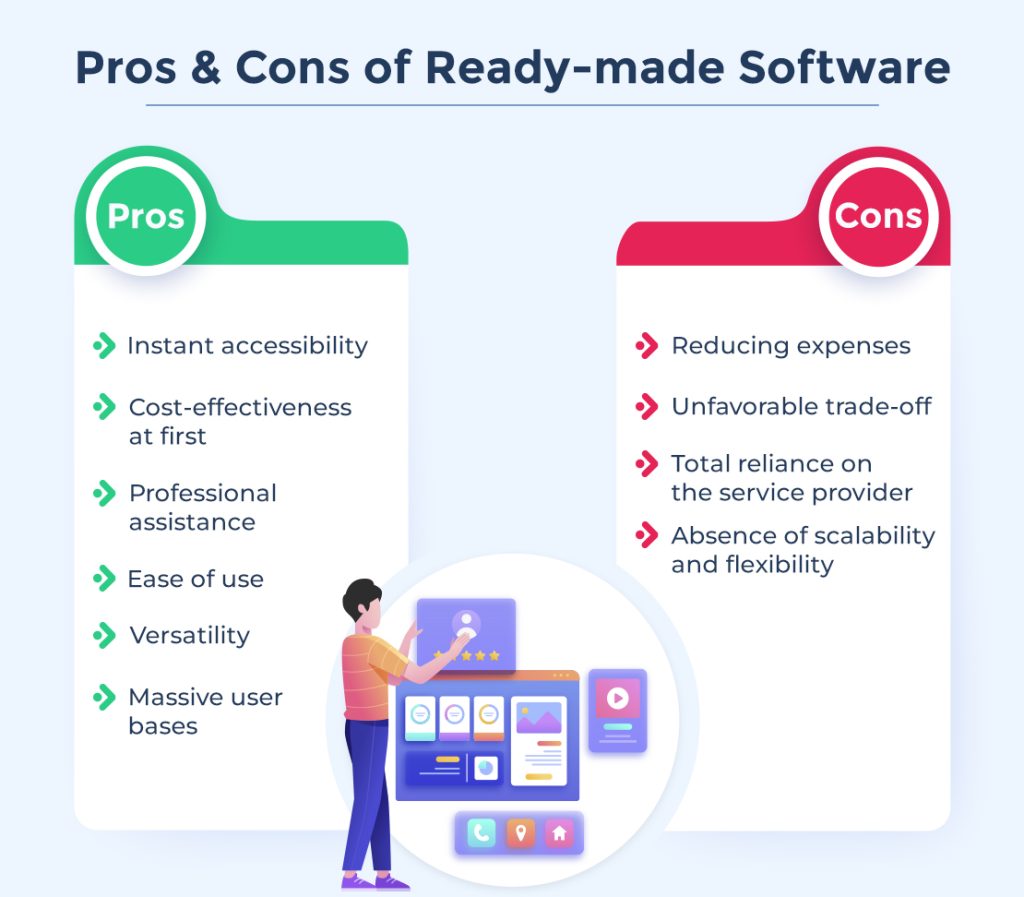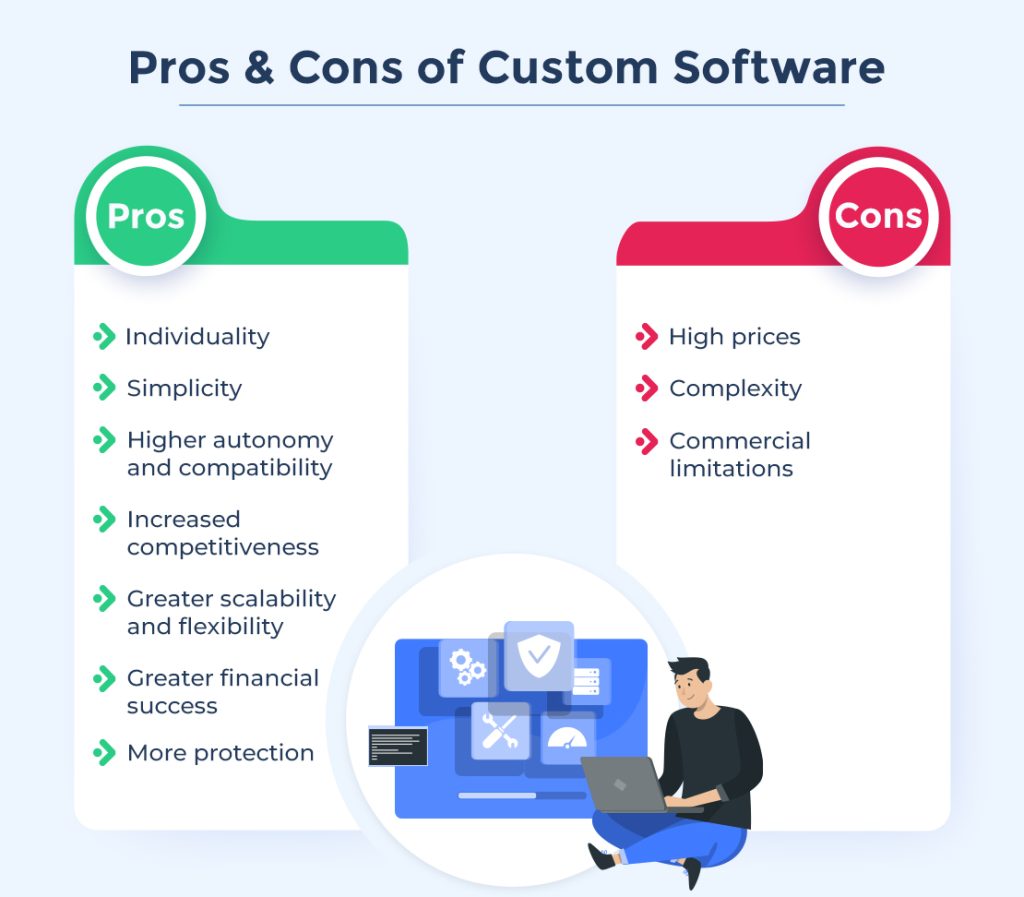Businesses today need efficient software to solve their business-critical tasks or operations, including data management, customer service improvement, and many other processes.
Today, the market brings a wide range of paid and free readymade software solutions. But before the rise of readymade software platforms, technology like this was affordable only for the large enterprises having higher IT budgets. Now, every business owner having a minimal budget can start their fully-functional business application. Sounds good, isn’t it?
It is fascinating to go for readymade software solutions until you have the challenge of growing the application’s functionality to fulfill the increasing business needs. And that’s where you will think of going for custom software development. However, custom web application development has its own set of challenges.
So, what to consider when making a choice?
Well, any choice is a risk! Based on the complexity of your business requirements, either you go for a readymade software solution or a custom software development, any choice will have its own set of problems to deal with. So, to simplify the choice, let’s examine the pros and cons of each type of software application.
Ready-to-use Software Application
Readymade software applications with enhanced functionality that appeal to many users. Since they are not particularly special but rather ubiquitous and made for widespread commercial use, they can typically integrate with current systems without complex settings.
Although a wide variety of software modules are available, ordinary functionality is occasionally insufficient for intricate or specialized jobs. Most off-the-shelf products can be customizable, but you won’t be able to fully meet all requirements with them.
Pros of Off-the-shelf Software Application

Instant accessibility. You can immediately launch a product and get to work without having to create any of your software.
Cost-effectiveness at first. Compared to the software produced from scratch, the cost of ownership is significantly lower. Flexible pricing options and free trial periods make this possible. You merely pay to utilize the platform, and the number of users determines the fee. Most solutions provide a free or reduced trial for testing purposes before purchase.
Versatility. You can buy multipurpose, feature-rich solutions off the shelf since developers strive to suit the needs of a wider user group. The range of features you must pay for is defined by the various plans, even though you may not use all of their capability.
Ease of use. The user interface is intuitive, even for unskilled users who might want more explanations and instructions. Every update is automatic.
Professional assistance. Professionals may deploy the software and can resolve technical problems remotely without involving your experts. Support is always looking for bugs and handling user complaints.
Massive user bases. Caring communities offer priceless assistance in the form of explanations and “life hacks” that simplify how to engage with a certain program for increased effectiveness.
Cons of Off-the-shelf Software Application
Reducing expenses. Off-the-shelf products are initially less expensive. Still, as more users are connected, licenses are purchased, and service fees are continually paid, their underlying costs may rise over time. The price of your initial tariff plan will undoubtedly increase due to feature expansion and the adoption of more recent software versions.
Unfavorable trade-off. The accessible features might not completely satisfy your demands, reducing your purchasing options. Workflows must be modified or completely altered to accommodate the software, not the other way around.
Total reliance on the service provider. Without your enterprise modernization plans’ permission, the vendor may update and modify the solution whenever they see fit. Some upgrades might hurt your system. Additionally, there is a chance that the software application developer will stop maintaining the application in the event of financial difficulties. In this case, you will need to find a different vendor.
Absence of scalability and flexibility. It’s possible that the product won’t work well or at all with current systems. Additionally, this issue may worsen following upgrades, and you will have no control over it. Similar to how you might not discover precisely what you require among the options provided by the provider when you wish to extend capabilities.
When should you go for an Off-the-shelf Software Application?
Multi-purpose solutions are ideal for businesses that must swiftly showcase and develop a project despite a lack of funding and in-house IT expertise. As they say, a cheap and cheerful solution without any added hazards or concerns.
This is why startups, businesses starting their digitization journeys, and conservative entrepreneurs who don’t want to invest too much in their goods before making substantial changes to company operations strongly prefer off-the-shelf items.
In general, readymade software solutions suit those who want to meet most of their business demands cost-effectively, streamline routine tasks, and conserve essential resources. The vast majority of businesses today prefer total products because of this.
Related Article: Understanding The Basics of On-Demand Business Model for Startups
Custom Software Application
Based on the unique requirements of a particular business, custom software solutions are built from the ground up, tailored to current business processes, and enable you to deploy new digital workflows quickly. A customized product created in accordance with the client’s preferences is typically designed for internal use alone and not for resale or distribution.
The same business manufactures and owns both specialized features and specific tools. And the best part is that focused capabilities are frequently used to their fullest extent, ensuring the highest level of performance and preventing unnecessary functionality or unintended expenses. The interface is created expressly for the customers and staff of the individual firm and may adjust functionality to meet changing business needs.
Pros of Custom Software Development

Individuality. Initial modifications to your business operations are made to custom applications.
Simplicity. A carefully thought-out design provides fewer errors and a speedy adjustment to the staff and consumer funnel process.
Higher autonomy and compatibility. You can integrate and expand software whenever you see fit and can automate many core activities.
Increased competitiveness. You have limitless customization options to make the application more user-friendly and enhance it as necessary.
Greater scalability and flexibility. You alone will determine what, how much, and when to alter, receiving easy scaling in response to new problems and flexible platform migration chances.
Greater financial success. For access and added features, there is no fee required more protection. Through sophisticated support, the risks posed by external threats are significantly decreased.
Cons of Custom Software Development
High prices. Since custom creation is more expensive than any subscription service, the initial cost will be higher.
It’s time to grow. Due to its complexity and length, it can take months or even years to complete a custom software development project.
Tech fashion. It is necessary to consider trends and dynamics of technology development to prevent potential commercial limitations.
When should you consider a Custom Software Application?
A customized approach is your best bet when ready-made software components fall short of meeting your criteria and your customer’s expectations. Therefore, custom software is your best option if you want a solution tailored to your needs and high-performing.
A custom solution will ultimately be exceptional and give your business a competitive edge from product design, development, maintenance, and promotion viewpoints. The following are some of the most typical uses for custom software development services:
- You manage a sophisticated, highly specialized company that necessitates technical software functions.
- Your company’s workflows are flexible and may occasionally change.
- To manage several stages of a single process, several tools are required.
- You require technological tools that are simple to integrate with other software programs.
- The learning curve should be as progressive as possible to make it easy for clients or staff to use the end product.
- Using and operating with highly tailored data is a feature of your business.
- It is necessary to update, digitize, or automate the firm workflow.
Final Verdict…
Although customized and off-the-shelf items are frequently utilized, the decision is mostly based on the scope, objectives of ongoing initiatives, and requirements of particular enterprises. Despite being aware of the differences between the concepts, you are frequently left to make your own decisions regarding the type to select and the pros you should consult.
If you are still in a dilemma, AddWeb Solution can help you! We offer ready-made software solutions that fit all industries and bring what you need without investing much.
Frequently Asked Questions
Readymade or off-the-shelf software is pre-built and available for general use. On the other hand, custom software is specifically developed to meet a particular business’s unique needs and requirements.
Readymade software is suitable for businesses with standard requirements and processes. It is a cost-effective and time-efficient solution for those who can adapt their workflows to the features provided by the pre-built software.
Custom software is preferable when a business has unique processes, workflows, or requirements not adequately addressed by existing off-the-shelf solutions. It provides tailored functionalities to align with specific business needs.
Readymade software is generally more cost-effective initially, as development costs are distributed across a broader user base. Custom software development may have higher upfront costs but can offer long-term cost savings by precisely addressing business needs.
Readymade software often allows for limited customization through settings and configurations. However, extensive customization is not always possible, and businesses may need to adapt their processes to fit the constraints of the off-the-shelf solution.
Readymade software providers control updates and feature releases. With custom software, businesses have complete control over the development roadmap, allowing them to prioritize and implement features based on their unique needs.
Drawbacks of readymade software include the possibility of limited scalability, the need to adjust business processes to fit the software, and potential security concerns if the software is widely used and targeted by malicious actors.
Custom software enhances efficiency by streamlining workflows and providing features tailored to business requirements. It can also contribute to competitiveness by offering unique functionalities that give the business a strategic advantage.
